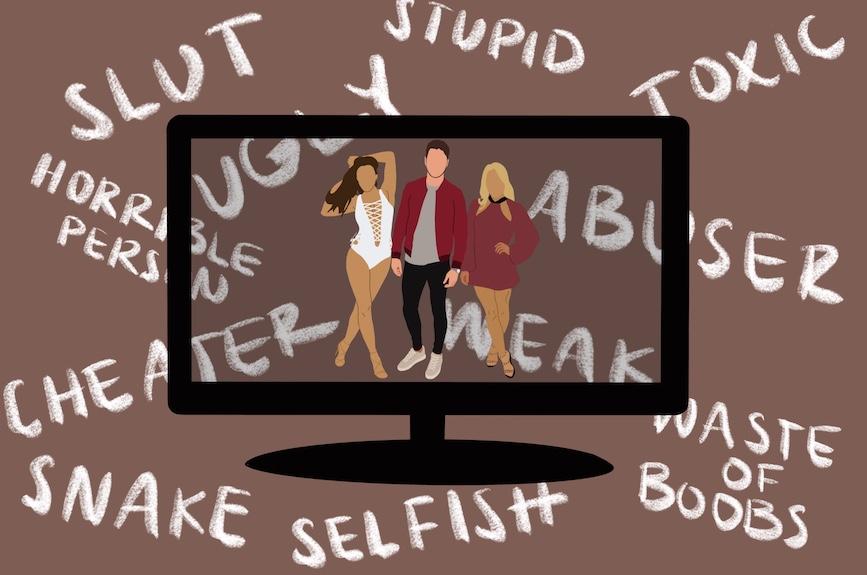TW: This article mentions suicide.
No matter the level of craziness, people across the world are in love with reality TV. We crave a glimpse into others’ lives whether it’s healthy or not, and we pick apart everything from their physical appearances to special on-camera moments. Curiosity about humankind is nothing new, but considering our own desires, it is easy to forget about the effect this representation has on cast members. Certain moments of their lives — whether staged or not — will follow them forever, affecting relationships, job opportunities and more.
While it’s likely many of us are active consumers of these shows, it is uncertain whether we could truly analyze the effects of these platforms on the subjects they portray.
Dating competition show “Love Island” has seen its fair share of tragedy — more so than most other reality programs. Since the U.K. edition’s first season in 2015, there have been three deaths by suicide — host Caroline Flack along with contestants Sophie Gradon and Mike Thalassitis.
Gradon, who passed away first in 2018, already admitted to being a victim of cyberbullying and trolls. Thalassitis coped with his grandmother’s death, faced mounting debts and struggled with substance abuse before dying by suicide in 2019. Flack died in 2020 while facing an assault charge against her boyfriend that would soon reach the media.
While the level of impact on mental health and individual situations will vary among contestants, the correlation among these events is no coincidence. Reality TV — seemingly more so than most other forms of entertainment — fosters a negative environment around those involved.
Molly-Mae Hague, runner-up from the U.K.’s fifth season, discussed this sort of trolling on Steven Bartlett’s “Diary Of A CEO” podcast. Citing a time when malicious paparazzi showed up and took unflattering pictures during a photoshoot for her tanning brand, Hague said she had no control over the content getting posted online that received excessive body-shaming comments.
When reality show stars emerge from their filming bubbles, the onslaught of feedback — good or bad — often overwhelms them.
Hague went on to say that “Love Island” has amped up its support for contestants in recent years.
“You meet with a psychologist before you go in, and when you’re on the show, people note down how much water you’re drinking, how much sleep you’re getting and if you’re struggling with anything,” Hague told Vogue in 2019.
This might seem like a kind gesture, but after what happened to previous contestants, it may serve as more of a warning. They need this heavy support because production expects them to deal with earth-shattering backlash in the real world.
One should also remember “Love Island” is not the only show with a poor track record, especially when there is still a lengthy history of reality programs treating their casts as less than human.
From 2006 to 2010, MTV’s “The Hills” followed a group of young people pursuing careers in Los Angeles while simultaneously navigating made-for-TV drama. Spencer Pratt, who was with then-girlfriend Heidi Montag, received criticism for his villainous portrayal of the toxic, abusive boyfriend trope.
“The worst of it isn’t what they showed me doing, but what they showed me saying,” Pratt told Vanity Fair in 2021. “It’s the sort of editing I am not down with, and feel is totally whack if you’re calling it reality,”
Although he admitted to playing a role, the production team allegedly distorted several on-camera moments. For example, when Pratt said, “Let’s hit that back door” at a Los Angeles club — which references the group’s VIP status — he was edited as saying he wanted to hit Montag.
However, this was not the only time they tampered with raw footage. Fabricating love triangles and mixing audio was nothing new, often resulting in a final product that far exceeded the original in entertainment value.
Ultimately, these production teams are making a sacrifice. Like journalists, they have the power to portray real people however they wish. Unlike journalists, they are producing content solely for entertainment. Oftentimes, ratings are the driving force behind decisions to portray cast members as do-gooders or demons.
In watching these distorted programs, viewers often feel they have well-informed opinions on the subjects’ lives. They might cross boundaries, make assumptions and comment on situations that are not necessarily accurate. At the end of the day, people behind the screen are still people and deserve the benefit of the doubt when it comes to their TV personalities.
Reality shows must consider how optics play a role in determining people’s real lives. Media training and regular wellness are unfortunately necessary in producing shows that are ethical for those involved.
If you or someone you know would like to donate to the fight against suicide and depression, please visit the National Suicide Hotline.
Edited by Sarah Rubinstein | [email protected]














